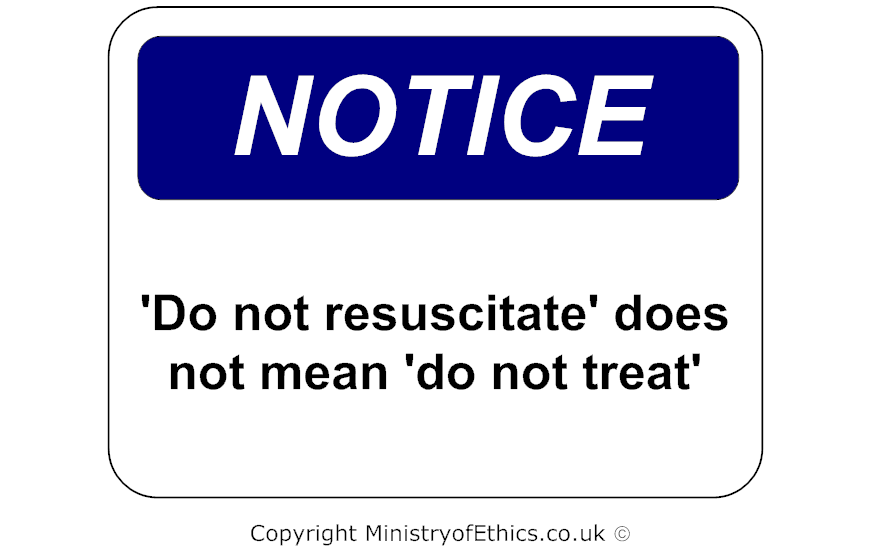CPR (Cardio-pulmonary resuscitation) is given to patients in cardiac and/or respiratory arrest to prolong life. CPR can encompass chest compressions, ventilation of lungs, defibrillation with electric therapy and injection of drugs. The survival rate after CPR is around 15-20% in a hospital setting.
What is a DNR order?
Also known as DNAR (Do not attempt resuscitate orders). DNRs are Do Not Resuscitate orders. This is a legal order which tells a medical team not to perform CPR on a patient. However this does not affect other medical treatments.

What is an AND?
AND stands for Allow Natural Death. Some physicians have suggested that the term DNR be replaced with AND. They argue that the abbreviation should stand for an action - "allowing" death - rather than the omission of an action - "not resuscitating" - which, they argue, elicits negative reactions. However, it is unlikely that such a prevalent term as DNR will be replaced in the near future.
What is the purpose of a DNR?
A DNR supports a patient's autonomy past the point where they are able to express this autonomy. Consequently, a DNR provides written evidence of a patient's wishes that can be used to guide the appropriate course of action taken by a medical team.
Is a DNR a form of advance directive?
Yes.
Does every patient have CPR?
When patients have cardiac and/or respiratory arrest there is presumed consent to CPR unless the patient specifically refused this therapy in advance.
There will be some patients for which CPR would be inappropriate (final stages of terminal disease where CPR would not be successful). Neither patients nor relatives can demand treatment which is clinically inappropriate to them.
Can DNRs be suspended?
For some patients on DNAR orders, they may develop cardiac or respiratory arrest via reversible causes (choking, anaphylaxis etc.), and in those situations CPR would be appropriate, unless the patient has specifically refused treatment in such cases.
For patients with established DNAR orders going into procedures known to have a chance of causing cardiac/respiratory arrest (e.g. cardiac catheterisation, surgical operations), DNARs may be temporarily suspended on discussion with the patients.
Should patients always be informed about DNRs?
Individual circumstances should dictate whether the DNR should be discussed with the patient. Some patients prefer to know in detail their care plans. For some patients who are approaching the end of life, informing them about a DNR order would be of little or no value. Clinicians should document the reason why a patient has not been informed of a DNR order; as they may be asked to justify their decision. This is especially the case of patients where they have indicated a clear desire to avoid such discussions.
What happens if the patient lacks capacity?
Patients undergoing cardiac/respiratory arrest will lack capacity. However valid advance directives can be set in place for this occurrence.
Patients with capacity can refuse CPR in advance (as they can with all other treatments) without necessarily giving justification to their decisions. However the health team must ensure that their decision is not based on any inaccurate information or any misunderstanding.
If a person lacks capacity and has appointed a welfare attorney who has authority to make clinical decisions; (or via a court appointed guardian to act on the patient's behalf), they should be informed of the DNR. Any previously expressed wishes should be considered whilst making a DNR decision.
What if a patient does not have an advance directive or LPA?
If a patient has not created an advance directive or LPA, family and friends may be consulted about the DNR. However, the final decision rests with the most senior consultant in charge of the patient.
Guidelines regarding patients who lack capacity are complex, and vary in different areas of the UK.
What happens if patients request CPR to be attempted?
If patients request CPR to be attempted, even if clinically there is a small chance of success the health care team should usually respect that decision. However there should be an honest discussion with the patient of the quality of life that can be expected post-CPR. If there is a lack of agreement then seeking a second opinion may be required.
Does the DNR apply to CPR only?
Yes. The DNR only applies to CPR, and does not apply to any other aspects of good routine care (biopsies, dialysis, surgery etc). All other aspects of treatment should continue.
Can children agree to DNRs?
A child (anyone under 18) can refuse to consent to medical treatment. However, this refusal can be overruled by the parents of the child or by a court. It is interesting to note that although there is right in law for patients to consent to treatment if they are below 16 (Gillick competence), or aged 16-17 (Family Law Reform Act 1969 s8), there is no right in law for patients to refuse treatment.
What does a DNR form look like?
DNR forms differ between hospitals.
An example can be found here East Midland's DNR form




 . About
. About